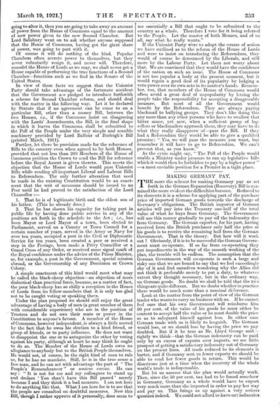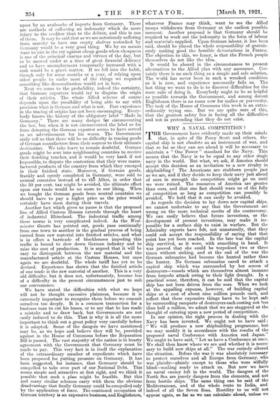MAKING GERMANY PAY. T HE more the schema for making Germany
pay as set forth in the German Reparation (Recovery) Bill is exa- mined the more evident the difficulties become. Reduced to its elements it is a scheme for applying part of the purchase price of imported German goods towards the discharge of Germany's obligations. The British importer of German articles will pay into the Treasury one-half of the total value of what he buys from Germany. The Government will use this money gradually to pay off the indemnity due from Germany. The German exporter, for his part, having received from the British purchaser only half the price of his goods is to receive the remaining half from the German Government. That is the theory. But how will it work out ? Obviously, if it is to be successful the German Govern- ment must co-operate. If so far from co-operating they put impediments in the way of the smooth working of the plan, the trouble will be endless. The assumption that the German Government will co-operate is such a large and risky one that we are bound to say that we feel exceedingly shy of it and find ourselves wondering why the Allies did not think it preferable merely to put a duty, to whatever extent they thought necessary, but in the ordinary way, on German goods. No doubt we shall be told that the two things are quite different. But we doubt whether in practice there would be much more than a nominal digerence.
Look at the matter from the point of view of the German trader who wants to carry on business with us. If he cannot feel sure that his own Government will reimburse him 50 per cent. of the value of his goods he must either be content to accept half the value or he must double the price so as to safeguard himself against loss. In either case German trade with us is likely to languish. The German would lose, or we should lose by having the price we pay doubled. But if it be true as Mr. Lloyd George said— rightly we think—that the German indemnity can be paid only by an excess of exports over imports, we see little prospect of getting a satisfactory indemnity out of Germany on the present lines. All trade reduced to its elements is barter, and if Germany sent us fewer exports we should be able to send her fewer goods in return. This would be disastrous just at a time when the recovery of the whole world's trade is indispensable. But let us assume that the plan would actually work. Then, since the 50 per cent. tax had to be found somehow in Germany, Germany as a whole would have to export very much more than she imported in order to pay her way and pay us. This, brings us up against a very serious question indeed. We. could not afford to have our industries upset by an avalanche of imports from Germany. There are methods of collecting an indemnity which do more i j inury to the creditor than to the debtor, and this is one of them. It may be said that as we are notoriously suffering from scarcity to have our empty shelves restocked by Germany would be a very good thing. We by no means want to join in the cry against cheap goods when cheapness is one of the principal charms and virtues of the day, but to be snowed under at a time of great financial delicacy and to have unemployment temporarily increased with a rush would be a grave matter. If we fell into the habit, though only for some months or a year, of relying upon other people to make most of the things we required something like demoralization would set in here.
Next we come to the probability, indeed the certainty, that German exporters would try to disguise the origin of their articles. The whole Allied scheme of course depends upon the possibility of being able to say with precision what is German and what is not. Past experience in the tracing of origins has not been encouraging. Every- body knows the history of the obligatory label " Made in Germany." There are many dodges for circumventing the law, but when it is not circumvented the label so far from deterring the German exporter seems to have served as an advertisement for his wares. The Government airily tell us that there will be no difficulty in tracing goods of German manufacture from their sources to their ultimate destination. We take leave to remain doubtful. German goods might be sent into neighbouring countries to receive their finishing touches, and it would be very hard, if not impossible, to dispute the contention that they were manu- factured products of the country from which they emerged in their finished state. Moreover, if German goods, frankly and openly completed in Germany, were sold to neutral countries instead of to the Allies, in order that the 50 per cent. tax might be avoided, the ultimate effect upon our trade would be no more to our liking. When we bought the German goods from neutral countries we should have to pay a higher price as the price would certainly have risen during their travels.
Another fact which gives us pause is that the proposed line of Allied Custom Houses extends through the heart of industrial Rhineland. The industrial traffic among these towns is very complicated indeed. As the West- minster Gazette has pointed out, goods pass continually from one town to another in the gradual process of being turned from raw material into finished articles, and what is in effect a barricade of blockhouses impeding this traffic is bound to slow down German industry and to raise the cost of production. It is argued. that it will be easy to distinguish between the raw material and the manufactured article at the Custom Houses, but once again we are doubtful. The whole tariff has yet to be devised. Experience has shown that the finished article of one trade is the raw material of another. This is a very old difficulty, but it does not, unfortunately, become less of a difficulty in the present circumstances just to suit our convenience.
We have stated the difficulties with what we hope will not be thought excessive plainness, because it is extremely important to recognize them before we commit ourselves too deeply. It is a common transaction for a business man to cut his losses, or to say that he has made a mistake and to draw back, but Governments are not easily induced to do this. That is why it is all the more important to think out a great policy very carefully before it is adopted. Some of the dangers we have mentioned may be, as we hope and believe they will be, provided against in the House of Commons before the Reparation Bill is passed. The vast majority of the nation is in hearty agreement with the Government that Germany must be made to pay. This very fact is in itself the explanation of the extraordinary number of expedients which have been proposed for putting pressure on Germany. It has been suggested, for instance, that Germany should be compelled to take over part of our National Debt. This seems simple and attractive at first sight, and we think it possible that such a plan might be feasible. But this and many similar schemes carry with them the obvious disadvantage that finally Germany could be compelled only by the application of force. The continued occupation of German territory is an expensive business, and Englishmen, whatever France may think, want to see the Allied troops withdrawn from Germany at the earliest possible moment. Another proposal is that Germany should be required to work out the indemnity in the form of labour and materials supplied. Upon German labour, it has been said, should be placed the whole responsibility of gratuit- ously making good the horrible devastations in France. The objection to this, we fancy, is that the French people themselves do not like the idea.
It would be absurd in the circumstances to present alternatives to the Allied plan with any assurance. Cer- tainly there is no such thing as a simple and safe solution. The world has never been in such a wrecked condition as it is now, and experience necessarily fails us. The last thing we want to do is to discover difficulties for the mere sake of doing it. Everybody ought to be as helpful as possible towards the Government, and among decent Englishmen there is no room now for malice or perversity. The task of the House of Commons this week is an extra- ordinarily trying one. But we are quite sure of this, that the greatest safety lies in facing all the difficulties and not in pretending that they do not exist.



































 Previous page
Previous page